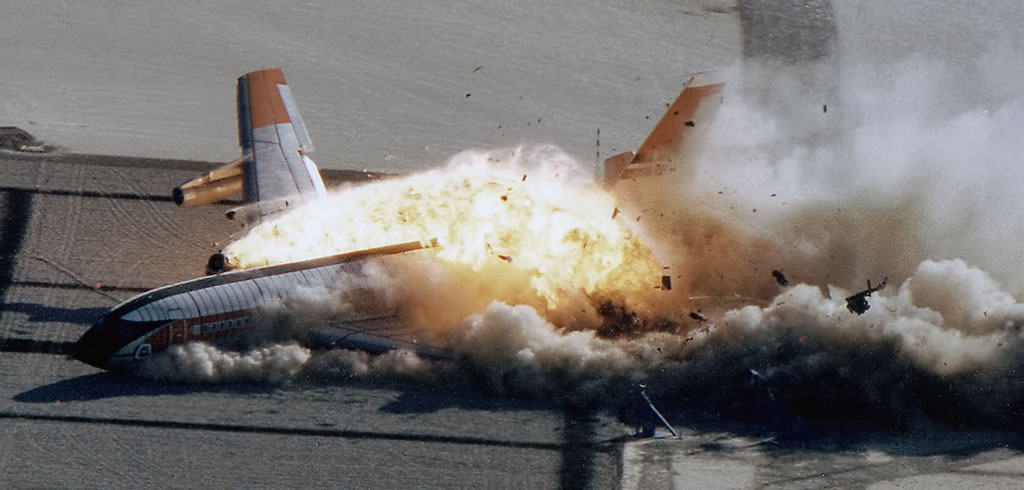Flying is the safest mode of transport. You are more likely to die on your way to the airport than on a plane. Crossing the road is more dangerous than flying. More people get struck by lightning every year than die in plane crashes. There is a negligible 1 in 11 million chance that you will die in a plane crash. Et cetera. And yet almost thirty percent of us are afraid of flying. Call us irrational if you want, but include within these irrationals the thirty percent of passengers who a fraction of a second before evaporating in a plane crash have time to think “I knew it”.
Numbers can never account for the intensities of subjective experience, particularly death. Yes, there is a 100 percent chance that you will die at some point but this is not what I mean. What I have in mind is a different approach to figures, Natalia’s. Natalia – played by the stunning and gifted Moro Anghileri – is one of the characters in Juan Villegas’s Sábado, a relatively obscure and droll Argentine comedy from the early 2000s.She says that she doesn’t believe in statistics: “if you win the lottery it means you had a 100 percent chance of winning it.” And I agree, because even if mathematically wrong, she is intensively right. How can you quantify subjective experience? Regardless of all your phone apps tracking your wellbeing, subjective experience escapes statistics, science and history. Whatever the figures say, when something happens to you it is 100 percent.
Back in 2010 I was involved in a terrifying mid-air incident. Not far from Buenos Aires, when our 747 was cruising over Uruguay, we entered an area of turbulence. It was a sudden and intense affair, with people screaming, hostesses bouncing about the cabin, luggage dropping on people. At some point the plane dove nose first towards the ground for what must have been a couple of minutes but felt like a couple of hours. I remember the ominous words “I knew it” playing in my mind – luckily I had a 100 percent chance of not dying in a plane crash that day. I also remember a strange feeling of calm taking over from my initial panic, perhaps because in my mind I had lived the nightmare a thousand times before. I had dreamed of being in plane crashes, I had anticipated every detail, I had lived every aspect of it beforehand – reality that day was following a well-rehearsed script. And soon the plane stopped bouncing and everyone stopped crying and screaming. Just like that things shifted back to a cold and indifferent normality (for some reason this last sentence plays in my head as read by Werner Herzog).
When we landed in Buenos Aires I knocked down a double whisky at the airport bar; soon I was able to continue my journey into the city centre. I remember driving a rented car some time later, having the earth just a touch away. Yes, cars are more dangerous than planes – particularly after a double whisky – but I was happy to be on wheels and in control, however imaginary that control might have been. Still, I couldn’t shake off a strange feeling of unfamiliarity with myself: I had lived my worst fear and I hadn’t lost my head and one is not supposed to react like this to nightmares. I guess the overarching morale is that even nightmares can be normalised – everything can.
Luckily, I wasn’t ‘cured’ of my aerophobia: my fear simply mutated into hatred. Hatred of planes, pilots, airports, hostesses, duty free shops, runways, the bad films, the safety instructions, the whole lot. Well, perhaps I don’t hate pilots and hostesses, but I can’t make my mind up why someone might choose to spend their life flying from A to B back and forth. Flying is arrogant, unnatural, most of the times unnecessary, an inconvenient convenience. It is a hassle from its seminal moments until long after landing. The ridiculous amount of time needed to get to and from the airport, the invasive security checks performed by frustrated coppers, the blind faith in the ability and sanity of individual and machine, the unhealthy food, the cramped spaces, the overpriced perfume and tacky shit sold to you as bargains, and so on, make flying a very dull-witted way to spend one’s time. This is what our phobias are trying to spare us from – trying to cure oneself of the fear of flying might not be suicidal but it is certainly masochistic and perhaps counter-revolutionary too.
So why can’t we resist this drive to leave the ground. We are victims of our times, as the billions of human beings who came before us were victims of theirs – we got flying, others got The Plague. We arrived at a moment in time when the aviation industry was officially established and no longer the occupation of a couple of rich lunatics. Now our boredom disguised as curiosity forces us to make the effort to be equally bored in other places. Our constantly shrinking world demands that we are shot like human bullets from one corner of the world to the other, just in order to feel ourselves part of that process. Yes, planes do get people together –– mostly people who wouldn’t be apart were it not for planes, or people that should never have met. And perhaps we are standing at the end of an era as well, and we phobics are showing the way ahead: people, stay at home. What is the point of these wanton trajectories? What is the point of actual travel when you can reach the furthest corner of the earth from a computer screen? I have never been to New York but I have walked its streets with The Velvet Underground and Google Street View to the point of exhaustion. I have never been to India, but I have seen so many documentaries on Youtube about Delhi, I have eaten so many curries, that getting myself all the way there would be quite pointless. And once you have been to London you have been in every city in the world, nature looks better on the telly, the aurora borealis is only stunning in photographs (trust me on this one, I have been to Iceland), Mount Everest is just a lump of snow likely to kill you (I have been to Nepal), and nobody is so interesting as to justify spending any amount of hours 10,000 feet off the ground. And if they are: what were you doing far from them?
What is it with plane crashes that capture our imagination so much? Why is dying in a plane crash the prima donna of perambulating death? There might be issues about giving up control, different phobias coming together, the promiscuity of sharing one’s death with a hundred other football-shirt-clad economy travellers. For whatever the reason every plane crash becomes a landmark, a candidate for every front page, even if plane-related deaths continue to be abysmally below those caused by any other form of transport. And perhaps it is a matter of intensities as well. Our eyes crave spectacles and plane crashes and the narratives they inscribe are certainly spectacular. From Proust onwards, dying in a plane crash is fascinating (the reference is of course to Proust’s chauffeur Alfred Agostinelli’s death in a plane crash. Agostinelli is thought to have inspired the character of Albertine in Proust’s In Search of Lost Time.). The media and the public love them. We have all stared at planes flying over us and secretly wished they would come crashing to the ground, just to satiate our scopophilic fantasies. Eventually our wishes come true; other times these fucking planes just disappear into thin air, taking our imaginations with them, teasing our eyes with a lack of photographs of torn metal and smoking corpses.
Since March 2014, the case of MH370 has provided a fantastic example of the latter. The lack of closure has left everyone in a state of suspension, particularly the press, for over a year now speculating over what could have happened, blogging non-events live for months (the search here, the search there, the non-search), excreting pixel after pixel of hypotheses and possible scenarios. We might never find out what happened to this flight –– our inability to provide satisfying clues to this mystery is a phenomenon that underscores how impotent we are each time we set foot on a plane: flying continues to imply a transferal of power similar to that between the victim and a kidnapper. Aerophiles are nothing but morons with Stockholm syndrome.
And some months later MH17’s disaster went against all logical figures. What were the odds for two planes from the same company to gain such a grim notoriety within three months? One hundred percent, of course; “there was a one hundred percent chance that that would happen and that is why it happened,” Natalia would say.
In portrayals of MH17’s tragedy one of the most striking images was that of the doomed passengers’s personal items. Scattered about a barren Ukrainian field, these toys, suitcases and bags, airport novels, a selection of duty free items –– inorganic corpses playing stand-in to the 298 organic ones that the Western media was too shy to display (we can’t say the same about social media, of course). Seeing those personal belongings was painful, their presence a reminder of our own fragility: we all die when our time is up and we can do very little to establish the right mise-en-scène for our deaths. Argentine writer Nicolás Mavrakis, upon spotting a copy of Bernard Cornwell’s Sharper’s Devil amidst the wreckage wrote that the tragedy of bad literature is that it doesn’t even survive its readers. Beyond the propriety of doing criticism after mass murder – something I am doing here as well – I would say he read the scene wrong. A novel, however badly written might be, is able to survive a plane crash more or less unharmed. Our tragedy is that even bad literature survives us.
Many a plane has gone down since flight MH370, some in more or less spectacular ways. And a new catastrophe has toppled them all: Germanwings flight 9525. At the moment of writing every sign points to the co-pilot – Andreas Lubitz – intentionally crashing the plane into a ravine. It reads like a horror story, that someone may decide on a whim to crash a packed plane against a mountain. It is almost impossible to comprehend, when you see the photographs of characterless Lubitz: we have become used to associating these events with fanatics of this or that other kind –– mass murder becomes unbearably uncanny when it is performed by folk who look like us.
While the press continue to dissect Lubitz’s mind, while they keep reproducing the faces of the dead on our screens, while they keep speculating over the amount of minutes the passengers knew about their impending deaths, and as the aviation industry deploys all their mouthpieces to repeat on loop that flying continues to be the safest mode of transport – and they are right – at the last moment it is only about Natalia’s one hundred percent. Some might call it fate, but that would be too metaphysic. It is only about numbers, in their absolute subjective sense. It is only about that one hundred percent, the only figure that matters.




